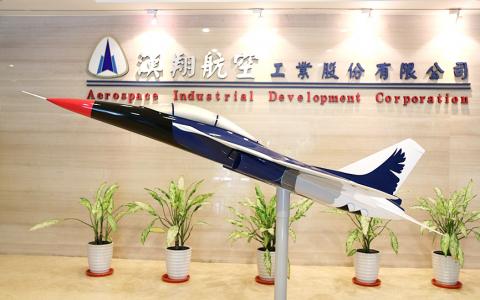Lawmakers yesterday proposed legislation that would require defense contractors to reserve part of the funds they receive from the government for defense-related research and development.
The proposal, which aims to revitalize the nation’s defense industry, was sponsored by Democratic Progressive Party legislators Liu Shyh-fang (劉世芳), Tsai Shih-ying (蔡適應), Chiu Chih-wei (邱志偉) and Chou Chun-mi (周春米), and New Power Party Legislator Freddy Lim (林昶佐), and was cosigned by 28 other lawmakers.
Companies awarded defense contracts of more than NT$100 million (US$3.25 million) should furnish 0.3 to 0.5 percent of the contract to a national defense industry development fund, which the government would establish, the bill says.

Photo: CNA
Should the bill pass into law, Aerospace Industrial Development Corp (漢翔航空) would have to pay at least NT$200 million of an advanced jet trainer program’s NT$69 billion contract value, a source familiar with defense contracting said on condition of anonymity.
Several defense contractors have expressed their misgivings, saying that the mandatory contributions would squeeze profit margins and reduce their willingness to bid for government contracts, the source said.
However, contractors have welcomed other aspects in the bill, the source said.
The legislation would allow the government to award contracts on a basis other than the lowest bid, the source said, adding that the government should be able to offset the negative effects of the mandatory contributions with tax credits.
The bill also calls for companies to have their military certification revoked if they or any of their personnel are indicted for leaking classified information, corporate espionage or corruption.
Authorities should restrict sanctioned companies from reapplying for military licenses for one to three years and immediately halt any projects they are handling, it says.

SECURITY: As China is ‘reshaping’ Hong Kong’s population, Taiwan must raise the eligibility threshold for applications from Hong Kongers, Chiu Chui-cheng said When Hong Kong and Macau citizens apply for residency in Taiwan, it would be under a new category that includes a “national security observation period,” Mainland Affairs Council (MAC) Minister Chiu Chui-cheng (邱垂正) said yesterday. President William Lai (賴清德) on March 13 announced 17 strategies to counter China’s aggression toward Taiwan, including incorporating national security considerations into the review process for residency applications from Hong Kong and Macau citizens. The situation in Hong Kong is constantly changing, Chiu said to media yesterday on the sidelines of the Taipei Technology Run hosted by the Taipei Neihu Technology Park Development Association. With

A US Marine Corps regiment equipped with Naval Strike Missiles (NSM) is set to participate in the upcoming Balikatan 25 exercise in the Luzon Strait, marking the system’s first-ever deployment in the Philippines. US and Philippine officials have separately confirmed that the Navy Marine Expeditionary Ship Interdiction System (NMESIS) — the mobile launch platform for the Naval Strike Missile — would take part in the joint exercise. The missiles are being deployed to “a strategic first island chain chokepoint” in the waters between Taiwan proper and the Philippines, US-based Naval News reported. “The Luzon Strait and Bashi Channel represent a critical access

‘FORM OF PROTEST’: The German Institute Taipei said it was ‘shocked’ to see Nazi symbolism used in connection with political aims as it condemned the incident Sung Chien-liang (宋建樑), who led efforts to recall Democratic Progressive Party (DPP) Legislator Lee Kun-cheng (李坤城), was released on bail of NT$80,000 yesterday amid an outcry over a Nazi armband he wore to questioning the night before. Sung arrived at the New Taipei City District Prosecutors’ Office for questioning in a recall petition forgery case on Tuesday night wearing a red armband bearing a swastika, carrying a copy of Adolf Hitler’s Mein Kampf and giving a Nazi salute. Sung left the building at 1:15am without the armband and apparently covering the book with a coat. This is a serious international scandal and Chinese

CARROT AND STICK: While unrelenting in its military threats, China attracted nearly 40,000 Taiwanese to over 400 business events last year Nearly 40,000 Taiwanese last year joined industry events in China, such as conferences and trade fairs, supported by the Chinese government, a study showed yesterday, as Beijing ramps up a charm offensive toward Taipei alongside military pressure. China has long taken a carrot-and-stick approach to Taiwan, threatening it with the prospect of military action while reaching out to those it believes are amenable to Beijing’s point of view. Taiwanese security officials are wary of what they see as Beijing’s influence campaigns to sway public opinion after Taipei and Beijing gradually resumed travel links halted by the COVID-19 pandemic, but the scale of